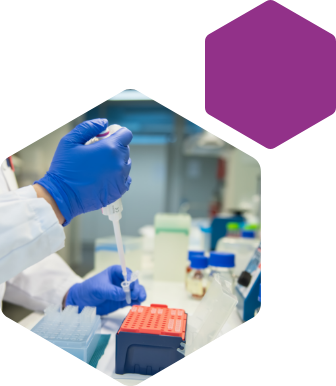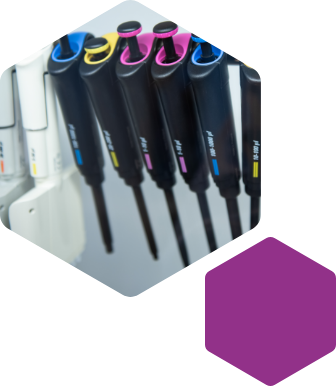Our services for in vitro Metabolism research
Our core expertise and the origin of our services lie in drug metabolism studies, which are available for all drug modalities, e.g., small molecules, peptides, oligonucleotides and ADCs.
We offer high quality in vitro metabolism services to evaluate the metabolic fate of your compound in the liver and in extrahepatic tissues, such as intestine, kidney, lung or skin. Assays are optimized for metabolite identification and profiling or measuring in vitro clearance.
In vitro metabolism assays are performed using various available enzyme source, from multi-species hepatocytes to subcellular fractions and recombinant enzymes, with high quality analytical UPLC/HR-MS-instrumentation. Studies for screening reactive drug metabolites and evaluation of acyl-glucuronide conjugate reactivity are included, as well as elucidation of the enzymes involved in the metabolism of your compound (CYP/UGT/SULT/NAT/FMO/MAO/CE/ALDH/AOX/XO/AKR/CR). Also in vitro – in vivo extrapolation modelling is available.
Metabolic Stability
- In vitro metabolism in hepatocytes, liver microsomes, S9, recombinant enzymes or extrahepatic tissues, a co-culture model for low clearance compounds
- Half-life, in vitro clearance
- In vivo extrapolation (to predict hepatic clearance & extraction ratio)
Measuring the metabolic stability of a compound in vitro provides an estimate regarding its stability, and thus elimination rate by metabolism in the body. Hepatic clearance is the most important parameter when assessing metabolic stability, and the most common approaches for its prediction are in vitro assays using liver microsomes or hepatocytes; the former focusing mainly on oxidative (CYP-mediated) metabolism, and the latter also on conjugative metabolism. For low clearance compounds, co-culture or sandwich models can be applied for investigating metabolic stability over several days.
When measuring the disappearance rate of a compound under linear velocity conditions in vitro, the results can be further extrapolated to in vivo hepatic clearance and extraction ratio, and also to evaluate the effect of hepatic first-pass metabolism to total oral bioavailability. When using UPLC/high-resolution-MS for sample analysis, also metabolite identification can be easily delivered from the same analytical data.
Metabolite Identification and Profiling

- In vitro metabolism in hepatocytes, liver microsomes, S9, recombinant enzymes or extrahepatic tissues
- Small drug-like compounds, peptides and antibody-drug conjugates
- Metabolic soft-spots
- Cross-species comparison
- UPLC with Q-TOF-MS or QE-Orbitrap-MS and UV detection
- UPLC with on-line or off-line radiodetection
- Isolation of metabolites
Metabolite identification and profiling are relevant in several stages of drug discovery & development. Optimization of metabolic clearance requires information on the main metabolically labile “soft-spots” and their further chemical modification. Selection of suitable animal species for toxicity studies is facilitated by the prediction of species with most similar metabolite profiles with respect to human (first in vitro and then in vivo). The correct evaluation of metabolic enzymes involved in clearance also requires identification of the metabolites, and eventually the metabolic clearance routes in human in vivo has to be characterized in a detailed level.
For in vitro this typically requires studies with enzyme sources such as liver (or extrahepatic) microsomes, S9 fraction, hepatocytes, and recombinant enzymes, while for in vivo the plasma and excreta are the major sample types. Analytically the UPLC/high-resolution-MS/MS techniques are the major tool for metabolite identification in all study types, supported partially by additional detection technologies such as UV/PDA, or radiodetection for the studies where 3H or 14C-labeled compounds are used. Upscaled production and isolation of the metabolite is also a valuable tool for both qualitative and quantitative purposes. For peptides, the metabolism (catabolism) is most often based on amide/peptide-bond hydrolysis reactions, which are efficiently identified by UPLC/high-resolution MS techniques. Besides small molecules and peptides, we offer metabolite identification services for antibody-drug conjugates (ADCs) as part of our portfolio for biologics.
Phenotyping of Metabolizing Enzymes
- Liver microsomes and CYP-selective inhibitors
- Recombinant CYP, FMO, MAO, CE, AOX, UGT, SULT and NAT
- UPLC with Q-TOF-MS or QE-Orbitrap-MS

Enzyme phenotyping provides information on the enzymes involved in the metabolism of a new chemical entity, which is needed to evaluate the drug interaction vulnerability of the compound as a “victim-drug”. The phenotyping of metabolizing enzymes is also needed to evaluate the risk for highly variable clearance between individuals or populations due to the involvement of enzymes with high degree of polymorphism. A thorough evaluation of metabolizing enzymes also requires metabolite identification.
The most common approach for enzyme identification is the use of recombinant enzymes and extrapolation of the results based on the in vivo protein levels, and the use of liver microsomal incubations together with cytochrome P450 (CYP)-selective inhibitors under linear metabolite formation kinetics. In both methods, monitoring of metabolite formation is clearly more reliable than monitoring substrate depletion only, although the latter is often used for high throughput evaluation. The clever use of HR-MS technology allows metabolite monitoring later on from the very same LC/MS data, even if only substrate depletion was analyzed in the first place. For more thorough evaluation of in vivo role of each enzyme, evaluation of kinetic parameters Vmax and Km with different enzymes would be advisable.
Non-CYP Mediated Metabolism
- Metabolic stability and metabolite identification
- Phenotyping of metabolizing enzymes
- UGT, SULT, NAT, FMO, MAO, CE, ALDH, AOX, XO, AKR, CR
- Recombinant enzymes, liver microsomes, S9, cytosol, and hepatocytes or extrahepatic tissues
If CYP-focused enzyme phenotyping assays do not show clear results, non-CYP mediated metabolism should be studied and the enzymes involved in the metabolic processes identified. This can be done by using recombinant enzymes, such as UDP glucuronosyltransferases (UGT), sulfotransferases (SULT), N-acetyltransferases (NAT), flavin containing mono-oxygenases (FMO), monoamine-oxidases (MAO), carboxylesterases (CE), or aldehyde dehydrogenase (ALDH). Metabolism via aldehyde oxidase (AOX), xanthine oxidase (XO), aldo-keto reductase (AKR) and carbonyl reductase (CR) can be investigated by using human liver cytosol with enzyme-selective inhibitors.
Extrahepatic Metabolism

- In vitro metabolism in intestine, kidney, skin, plasma
- Microsomes, S9 and homogenates
Although the liver is the major drug metabolizing organ in the body, other tissues, such as intestine, kidney and skin may also play a significant role in the metabolism of xenobiotic compounds. The role of each organ varies depending on the administration route and distribution of the compound between the organs. The abundance of metabolizing enzymes (CYPs and conjugative enzymes) also varies in each organ/tissue even with qualitative differences. From the experimental point of view, different tissue subfractions are routinely used together with modern analytical techniques. For more thorough evaluation of in vivo role of each organ, evaluation of kinetic parameters Vmax and Km with organ-dependent preparates would be advisable.
Metabolite Production
- Production using recombinant enzymes, liver microsomes or biomimetic catalysts
When confirmation of structure of the drug metabolite or its quantification is needed, we have a selection of biological and biomimetic tools available to upscale the metabolite production, followed by isolation using preparative chromatography.
Reactive Metabolites

- GSH, KCN, semicarbazide trapping with UPLC/HR-MS detection
- Covalent binding with radiolabeled compounds
One of the reasons behind unexpected drug induced toxicity can be chemically reactive metabolites that bind covalently to protein or DNA. Due to their high reactivity and short life–span, these metabolites cannot be analyzed directly as such, but have to be first stabilized by trapping agents, such as S-glutathione (GSH), cyanide (KCN) or semicarbazide (SCA). Of these, GSH is clearly the most used trapping agent, although KCN and SCA may be used for trapping certain types of reactive metabolites that are not trapped by GSH, such as iminium ions or aldehydes. As in any analysis of unknown drug metabolites, the use of liquid chromatography with high-resolution mass spectrometry delivers the highest quality data with the shortest time consumption also in our reactive metabolite screening assay.
In addition to screening, we can also perform a more comprehensive quantitative evaluation of reactive metabolite formation by utilizing a radiolabeled compound and measuring the radioactivity of the reactive metabolites covalently bound to proteins within the in vitro metabolic system.
Acyl Glucuronide Reactivity
- Stability and reactivity of acyl glucuronide metabolites
- No need for synthesized metabolite
- UPLC/HR-MS detection
Although glucuronide conjugation is most often considered as a detoxifying metabolic route, acyl glucuronide conjugates, formed in the presence of carboxylic acid group, may cause toxicity by covalent binding to proteins. Liability for toxicity of an acyl glucuronide metabolite may be evaluated by measuring the rate of acyl-migration, i.e., formation of isomeric acyl glucuronides and eventually formation of reactive aldehyde isomer. This method is a valuable tool for assessing acyl glucuronide reactivity without the need for synthetized glucuronide metabolites. In addition to acyl glucuronide conjugates, the formation of even more reactive Acyl CoA conjugates or other related conjugates (glycine, taurine, carnitine) may be investigated by our methods.
